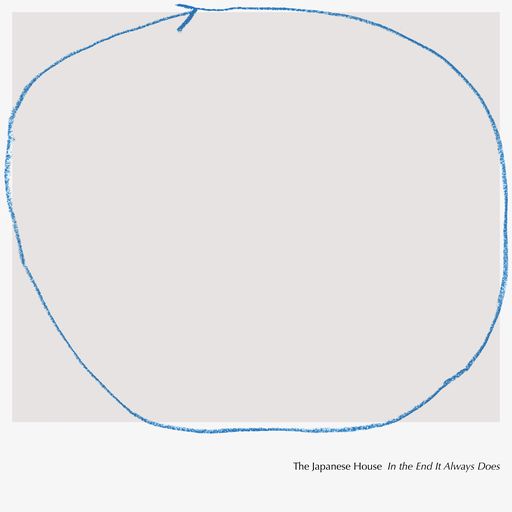The Japanese House – In the End it Always Does: Distinctly understood and uplifted

Introspection isn’t usually this much fun. Yet, Amber Bain of The Japanese House has crafted a deeply intimate, yet energetic second album. Four years after the release of her debut album, Good at Falling, Bain has transcended her music further into the pop realm than her previous efforts. Much like her the sound of her collaborators and close friends, The 1975, In the End it Always Does echoes their signature psychedelic-pop and synth sound. Tackling heartbreak, vulnerability, queerness, and longing, the rawness of her lyrics is laced masterfully into upbeat melodies.
I first saw The Japanese House at the Brixton Academy in 2016, opening for The 1975 in full double denim. The love affair with her music started there. As a 15-year-old with little experience with love and loss, I admired her sound for just being flat out cool. Now, as a 21-year-old listening to her latest release, I’m left feeling distinctly understood yet uplifted.
From the opening track, ‘Spot Dog’, it’s clear the album is taking The Japanese House in a slightly more ethereal pop direction. Evoking The 1975’s typical opener on each of their studio albums, the track sets the tone instrumentally. This makes sense given Matty Healy and George Daniel of the band both contributed to the record. We’re introduced to the piano and synths which feature throughout the record, whilst those familiar melodies that show off Bain’s vocal range from the previous album come through.
The next two tracks, ‘Touching Yourself’ and ‘Sad to Breathe’, are true highlights. Oozing twenty-something angst through the lyrics, ‘Touching Yourself’ touches on that somewhat obsessive sexual longing for a crush with a slight Talking Heads ‘Speaking in Tongues’ instrumental arrangement. The already released ‘Sad to Breathe’ has shot straight up to the top of my Spotify On Repeat. The lyrics capture that melancholic mourning for a relationship that didn’t work out, “I forget. I can’t tell if the things I have I just don’t want, or the things I want I just don’t get.” It’s a track you can both sorely relate to yet also dance around your bedroom to (both of which I’ve enjoyed doing the last few weeks).
The album then moves to some slower but vocally elevated songs with ‘Over There’, melodically mirroring ‘When We Are Together’ from the 1975’s latest album. Both ‘Over There’ and ‘Morning Pages’ exhibit Bain’s aptitude for gentle vocals even at higher notes with the harmonic layered vocals that feature throughout the album. Both are soothing listens with an intimate commentary on yearning for a former lover and how confounding navigating recent heartbreak can be.
‘Boyhood’, the most successful of the album’s single releases so far, comes next. Arguably, it’s a Japanese House classic; Bain’s ability for vulnerable song writing within gorgeously elevated pop music is best shown off here. Primarily inspired by the events that preceded the album, Bain attributes being in a thruple and ‘the slow dissolution of those relationships’ as the context for this album coming together. Evident in the lyrics is the confusion left by things falling apart, but with snapshots of the clarity that hindsight has given her.
‘Indexical Reminder of a Morning Well Spent’ is another gentle acoustic song with warm vocals. Describing the mundane tasks you have to find gratitude in after loss, it’s certainly one for your Spotify breakup playlist. It’s refreshing to hear Bain’s talk about loving and losing women, singing ‘she’ and ‘her’ in every song, something we sparsely access in pop music, unless you’re a regular listener of Clairo and King Princess.
Bain has worked with Chloe Kramer on this record, who has previously collaborated with Lava La Rue and Glass Animals. An experience she described as ‘life changing’, which she attributes to the understanding between marginalised genders in a creative space. “I’d never worked with a woman or queer person in that way before. It’s nice to have someone who completely understands your standpoint and shared experience.”

The track ‘Friends’ has a giddy upbeat almost salsa-dancing energy to it. Whilst ‘Sunshine Baby’, another single from the album, is another jewel. Capturing that heartsick exhaustion with lyrics, “I miss the feeling that you get when someone fits just like a glove.” This track again exhibits Bain’s vocal aptitude for those higher notes. Listen closely to catch (what my die-hard 1975 ear assumes to be) Matty Healy on the vocals. Although, Healy and Daniel from the 1975 have clear influence on the sound, The Japanese House has also collaborated with MUNA’s Katie Gavin and Bon Iver’s Justin Vernon. She attributes Gavin in particular with injecting her with “creative energy and inspiration throughout”.
‘Baby Goes Again’ and ‘You Always Get What You Want’ are less upbeat acoustic numbers, but still with exciting guitar arrangements and the characteristic synth sounds of the album. Where some listeners might find the album ventures into slower songs in a few places, what you can’t fault is the lyrics. What In the End it Always Does evidences is that those innermost thoughts Bain feels so comfortable sharing with us, almost like something straight out of her journal at points, can be made into a characteristically upbeat pop melody or a gentler more intimate listen.
The album ends on a particularly strong song, and the final single, ‘One for Sorrow Two for Joni Jones’. Ending on the piano the album starts with, it’s clear that In the End it Always Does has been a cyclical journey of reflection, perhaps echoed in the album design of a drawn circle. Bains describes this as her favourite song, “an ode to that feeling when Emma Thompson stands there and cries when she’s holding the CD in Love Actually. The lyrics are about the confirmation that my relationship was dead.” A favourite scene of mine. Whilst the album is certainly a glimmering and sophisticated pop masterpiece, the sentiment felt by my 15-year-old self seeing The Japanese House for the first time remains; Bains, her inspiration and style remain to be flat out cool.
In the End it Always Does will be available to stream on June 30th.
5/5







